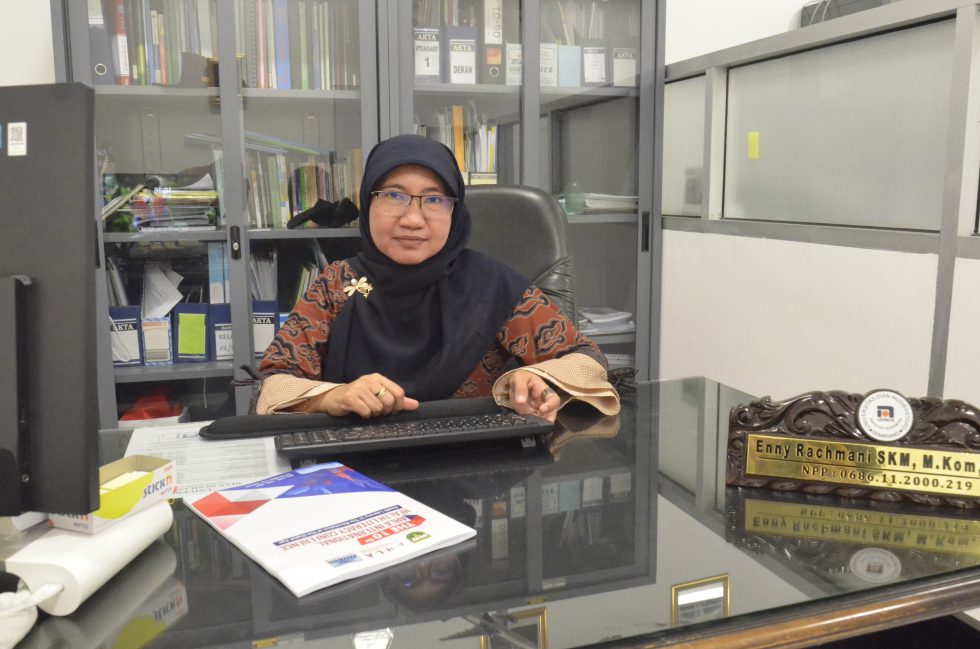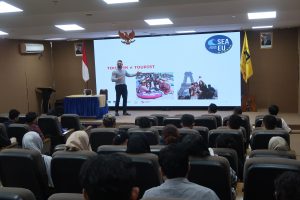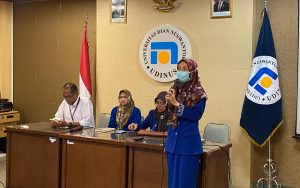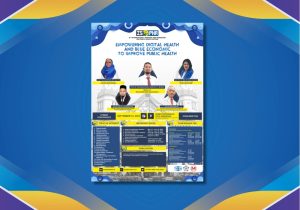The Health Science Faculty at Universitas Dian Nuswantoro (Udinus) has made an innovative technological breakthrough to control leprosy disease by implementing the e-Leprosy Framework. This framework was implemented in 27 different health centers in Pekalongan Regency, Central Java. It managed to improve patients’ discipline during the medication process.
The leader of the research team developing the e-Leprosy Framework, Enny Rachmani, S.K.M., M.Kom., Ph.D., explained that e-Leprosy was a web-based system designed to help medical professionals and patients overseeing leprosy medications. The e-Leprosy system is equipped with a reminder feature utilizing the Short Message Service (SMS), in which the message would automatically be sent to patients, their families, and medical professionals.
“Through this system, we could see a 13.9 percent improvement in patients’ punctuality during their visits for medication. This shows that an innovation as simple as an SMS reminder can provide a significant impact on medication processes,” Enny uttered.
The research involved four different phases, including preparation, early assessment, intervention, and evaluation. During the process, leprosy surveillance officers and patients will be actively involved. The results show that the integration of the e-Leprosy system could help medical professionals in handling their tasks and resolving the difficulties in supervising patients after the medications.
Despite that, Enny admitted that the program implementation encountered several issues, especially the technological gap in rural areas. Many medical professionals in these areas were not used to using technologies like the internet and computers. However, through intensive training programs and motivations, they successfully adopted the system properly.
“We understand that the low digital literacy was among the most prominent problems, but consistent training will improve their overall capabilities. This can be proven by the positive responses from the medical professionals helping us in the e-Leprosy program,” Enny added.
In addition to helping medical professionals, the e-Leprosy system also brought positive impacts to patients. With reminders through SMS, patients will become more disciplined in attending Multi-Drug Therapy (MDT) sessions, which normally last for six to twelve months each session. This therapy is important to prevent further infection and complications, like drug resistance.
“This success shows that technological innovations can provide tangible solutions for various public health challenges, particularly in areas with limited health facilities. Hopefully, this system will later be adopted thoroughly across the nation,” Enny concluded.
The research was among the most important steps in utilizing digital technology to improve health services in handling overlooked tropical diseases in Indonesia. With promising results, e-Leprosy is expected to be a model for the development of other innovations within the health sector.
The research involved researchers from Udinus and global researchers. From Udinus, these researchers scoped Prof. Dr. Ir. Edi Noersasongko, M.Kom—the Rector of Udinus, Dr. Guruh Fajar Shidik, S.Kom., M.Cs., and Prof. Dr. Drs. Jumanto, M.Pd. Meanwhile, the global researchers included Ming Chin Lin and Usman Iqbal from Taipei Medical University, as well as Chien Yen Hsu from the National Taipei University of Nursing and Health Science. (Humas Udinus/Alex. Foto: Humas Udinus)







